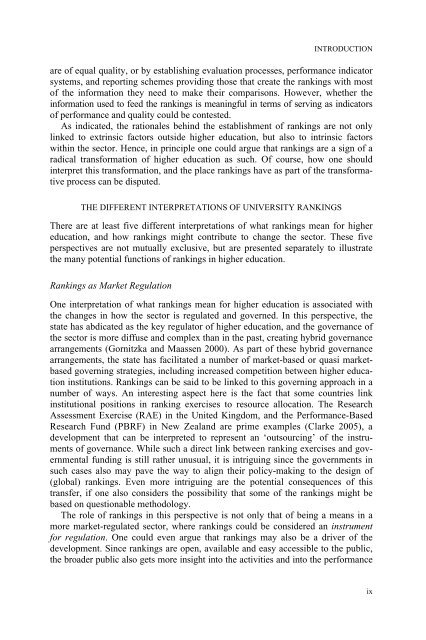University Rankings, Diversity, and the New ... - Sense Publishers
University Rankings, Diversity, and the New ... - Sense Publishers
University Rankings, Diversity, and the New ... - Sense Publishers
You also want an ePaper? Increase the reach of your titles
YUMPU automatically turns print PDFs into web optimized ePapers that Google loves.
INTRODUCTION<br />
are of equal quality, or by establishing evaluation processes, performance indicator<br />
systems, <strong>and</strong> reporting schemes providing those that create <strong>the</strong> rankings with most<br />
of <strong>the</strong> information <strong>the</strong>y need to make <strong>the</strong>ir comparisons. However, whe<strong>the</strong>r <strong>the</strong><br />
information used to feed <strong>the</strong> rankings is meaningful in terms of serving as indicators<br />
of performance <strong>and</strong> quality could be contested.<br />
As indicated, <strong>the</strong> rationales behind <strong>the</strong> establishment of rankings are not only<br />
linked to extrinsic factors outside higher education, but also to intrinsic factors<br />
within <strong>the</strong> sector. Hence, in principle one could argue that rankings are a sign of a<br />
radical transformation of higher education as such. Of course, how one should<br />
interpret this transformation, <strong>and</strong> <strong>the</strong> place rankings have as part of <strong>the</strong> transformative<br />
process can be disputed.<br />
THE DIFFERENT INTERPRETATIONS OF UNIVERSITY RANKINGS<br />
There are at least five different interpretations of what rankings mean for higher<br />
education, <strong>and</strong> how rankings might contribute to change <strong>the</strong> sector. These five<br />
perspectives are not mutually exclusive, but are presented separately to illustrate<br />
<strong>the</strong> many potential functions of rankings in higher education.<br />
<strong>Rankings</strong> as Market Regulation<br />
One interpretation of what rankings mean for higher education is associated with<br />
<strong>the</strong> changes in how <strong>the</strong> sector is regulated <strong>and</strong> governed. In this perspective, <strong>the</strong><br />
state has abdicated as <strong>the</strong> key regulator of higher education, <strong>and</strong> <strong>the</strong> governance of<br />
<strong>the</strong> sector is more diffuse <strong>and</strong> complex than in <strong>the</strong> past, creating hybrid governance<br />
arrangements (Gornitzka <strong>and</strong> Maassen 2000). As part of <strong>the</strong>se hybrid governance<br />
arrangements, <strong>the</strong> state has facilitated a number of market-based or quasi marketbased<br />
governing strategies, including increased competition between higher education<br />
institutions. <strong>Rankings</strong> can be said to be linked to this governing approach in a<br />
number of ways. An interesting aspect here is <strong>the</strong> fact that some countries link<br />
institutional positions in ranking exercises to resource allocation. The Research<br />
Assessment Exercise (RAE) in <strong>the</strong> United Kingdom, <strong>and</strong> <strong>the</strong> Performance-Based<br />
Research Fund (PBRF) in <strong>New</strong> Zeal<strong>and</strong> are prime examples (Clarke 2005), a<br />
development that can be interpreted to represent an ‘outsourcing’ of <strong>the</strong> instruments<br />
of governance. While such a direct link between ranking exercises <strong>and</strong> governmental<br />
funding is still ra<strong>the</strong>r unusual, it is intriguing since <strong>the</strong> governments in<br />
such cases also may pave <strong>the</strong> way to align <strong>the</strong>ir policy-making to <strong>the</strong> design of<br />
(global) rankings. Even more intriguing are <strong>the</strong> potential consequences of this<br />
transfer, if one also considers <strong>the</strong> possibility that some of <strong>the</strong> rankings might be<br />
based on questionable methodology.<br />
The role of rankings in this perspective is not only that of being a means in a<br />
more market-regulated sector, where rankings could be considered an instrument<br />
for regulation. One could even argue that rankings may also be a driver of <strong>the</strong><br />
development. Since rankings are open, available <strong>and</strong> easy accessible to <strong>the</strong> public,<br />
<strong>the</strong> broader public also gets more insight into <strong>the</strong> activities <strong>and</strong> into <strong>the</strong> performance<br />
ix














